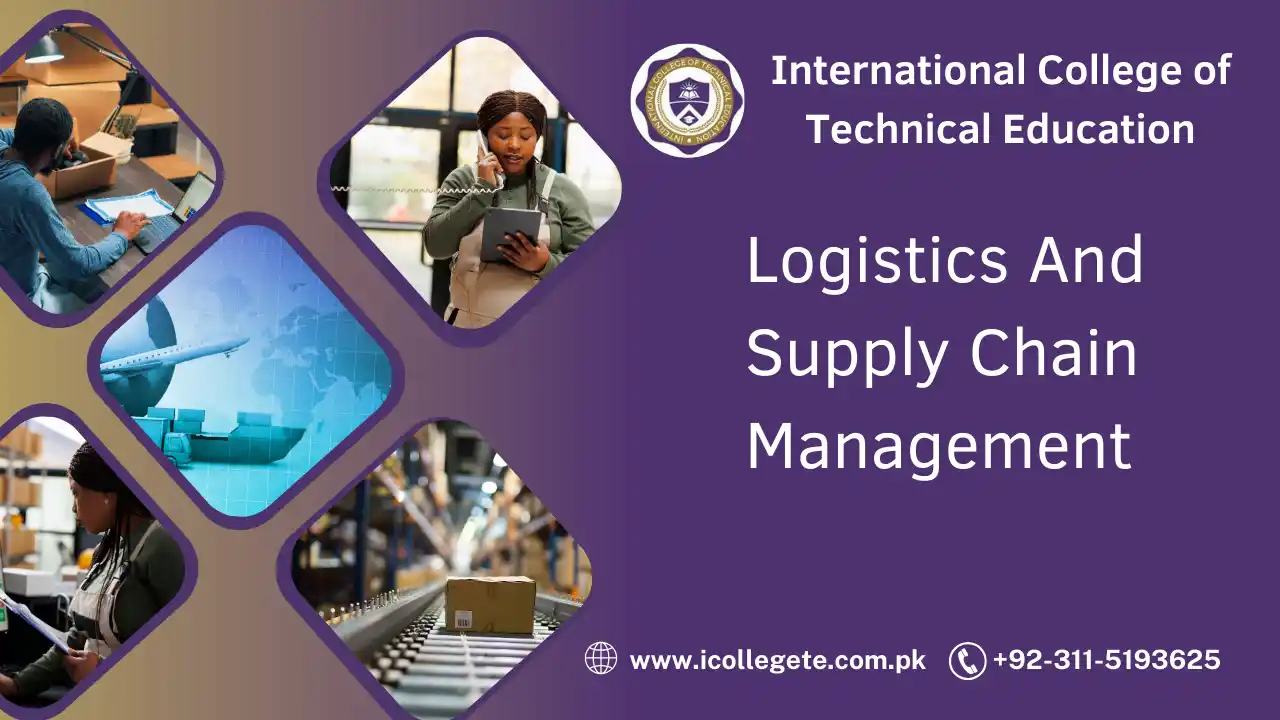Logistics and Supply Chain Management (LSCM) has become a cornerstone of modern business operations, ensuring products are delivered efficiently and cost-effectively. In Sialkot, a city known for its industrial base, the demand for skilled professionals in logistics and supply chain management has surged. As a result, several educational institutions offer specialized courses that equip individuals with the skills required to excel in this field.
The Logistics and Supply Chain Management course in Sialkot is designed to provide students with a comprehensive understanding of the processes involved in managing the flow of goods, services, and information from suppliers to consumers. The course covers both the theoretical and practical aspects of logistics and supply chain operations, offering students an in-depth knowledge of the industry’s key areas.
Through this course, participants will gain expertise in the core components of supply chain management, including procurement, inventory management, transportation, warehousing, and demand forecasting. The course focuses on developing problem-solving skills, critical thinking, and the ability to make informed decisions in a fast-paced, globalized business environment.
Course Overview
This course provides a well-rounded overview of the logistics and supply chain management field. Students will be exposed to key principles, strategies, and tools used in managing logistics operations effectively. Some of the key topics covered in the course include:
- Supply Chain Fundamentals: An introduction to the supply chain’s structure and its role in business operations.
- Procurement and Sourcing: Methods for acquiring goods and services from suppliers to meet organizational needs.
- Inventory and Warehouse Management: Techniques to control inventory, optimize storage, and manage warehouses.
- Transportation and Distribution: Understanding various transportation methods and how to plan and optimize distribution routes.
- Supply Chain Technology: A focus on modern technologies such as ERP systems, automation, and data analytics to enhance supply chain efficiency.
- Risk Management: Identifying and mitigating risks within the supply chain to ensure smooth operations.
- Global Supply Chain Issues: Examining the challenges faced by businesses in managing global supply chains.
The course typically combines lectures, case studies, group discussions, and hands-on projects to offer a practical learning experience.
Study Units
The study units in the Logistics and Supply Chain Management course are designed to cover a wide range of topics essential to understanding the intricacies of the field. These units may include:
- Introduction to Logistics and Supply Chain Management
- Procurement, Sourcing, and Supplier Relations
- Inventory Control and Warehousing
- Transportation and Distribution Management
- Logistics Strategy and Planning
- Supply Chain Risk Management
- Supply Chain Technology and Innovations
- Global Supply Chain Management
- Sustainable Supply Chain Practices
- Current Trends and Challenges in Supply Chain Management
These units aim to build a strong foundation for students, preparing them for real-world challenges they will face in the logistics and supply chain sector.
Learning Outcomes
Upon successful completion of the Logistics and Supply Chain Management course, students will be able to:
- Understand Supply Chain Dynamics: Gain a solid understanding of supply chain management, its processes, and how different parts of the supply chain interconnect.
- Develop Critical Thinking Skills: Analyze logistics issues, evaluate alternatives, and implement solutions in real-life business situations.
- Implement Inventory and Distribution Strategies: Learn to manage inventory, optimize warehousing processes, and plan transportation strategies to improve efficiency.
- Apply Technological Solutions: Leverage technology to solve logistics problems and enhance operational efficiency.
- Understand Global Supply Chains: Recognize the complexities of global supply chains and develop strategies to manage international logistics.
- Manage Risks in the Supply Chain: Identify potential risks and devise strategies to mitigate disruptions in the supply chain.
Course Benefits
The Logistics and Supply Chain Management course offers several benefits, making it a valuable investment for individuals looking to pursue a career in the industry:
- Industry-Relevant Skills: The course is tailored to meet the current needs of the logistics and supply chain industry, ensuring students gain practical, relevant skills.
- High Job Demand: With the growing reliance on global supply chains, there is a high demand for skilled professionals. Completing this course increases job prospects in various sectors such as retail, manufacturing, and transportation.
- Better Career Opportunities: The course equips students with the knowledge to take on roles such as supply chain manager, logistics coordinator, procurement specialist, and inventory manager.
- Global Perspective: The course offers insights into managing global supply chains, allowing students to work in multinational companies and understand international trade dynamics.
- Hands-On Learning: Practical exposure to case studies, projects, and simulations helps students gain real-world experience.
Who Is This Course For?
The Logistics and Supply Chain Management course is ideal for:
- Graduates and Job Seekers: Individuals with a background in business, management, or engineering who wish to switch to or specialize in supply chain management.
- Professionals Seeking Career Advancement: Current logistics or supply chain professionals looking to enhance their knowledge and skills to advance in their careers.
- Business Owners: Entrepreneurs who want to understand the logistics and supply chain processes better to improve the efficiency of their operations.
- Recent High School Graduates: Individuals interested in pursuing a career in logistics and supply chain management right after high school.
- Global Business Enthusiasts: Individuals who are interested in understanding the global aspects of supply chains, including international trade and the movement of goods across borders.
Future Progression for This Course
After completing the Logistics and Supply Chain Management course, students have various options for further education and career advancement. Some of the potential pathways include:
- Pursue Advanced Degrees: Students can pursue a Master’s degree in Logistics, Supply Chain Management, or Business Administration (MBA) to further specialize and improve their career prospects.
- Certifications: Earning industry-recognized certifications such as Certified Supply Chain Professional (CSCP), Certified in Logistics, Transportation, and Distribution (CLTD), or Six Sigma certifications can enhance expertise and credibility in the field.
- Specialization: Graduates can specialize in areas such as transportation management, warehouse optimization, or procurement, depending on their career goals.
- Leadership Roles: With experience, professionals can move into managerial or executive positions within logistics and supply chain departments of large organizations.
The Logistics and Supply Chain Management course in Sialkot provides an excellent opportunity for individuals looking to build a successful career in one of the fastest-growing industries. With a comprehensive curriculum, hands-on learning, and a wide range of career options, this course is a stepping stone to securing a future in logistics and supply chain management. Whether you’re just starting your career or looking to enhance your expertise, this course offers the knowledge and skills needed to succeed in the dynamic field of logistics.







